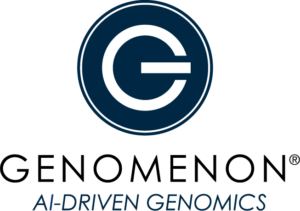FOR IMMEDIATE RELEASE
December 15, 2022 Ann Arbor, MI
New Study Shows Comprehensive Genomic Evidence is Critical for Calculating Rare Disease Prevalence
Genomenon’s Genomic Data Leads to Three-Fold Increase in Prevalence Estimate for ENPP1 Deficiency
Genomenon®, Inc., an AI-driven genomics company, today announced the publication of a paper in the Orphanet Journal of Rare Diseases that calculates the prevalence of ENPP1 deficiency—a disease claiming more than half of all infants within the first few months of life—to be more than triple the prior estimate. The study, conducted by the Genomenon scientific team and leading disease experts from the National Institutes of Health (NIH) and Münster University Children’s Hospital, highlights a core strength of Genomenon’s rigorous methodology for identifying and classifying genetic data needed to improve rare disease prevalence calculations.
“More accurate prevalence estimates for rare diseases are essential, as they not only justify investment in life-saving therapies, but also help pharma R&D and commercial teams successfully bring them to market,” said Genomenon Chief Scientific Officer and co-founder Mark Kiel, MD, PhD. “Discovery of this higher prevalence rate aptly demonstrates how our exhaustive knowledgebase of expertly curated genomic evidence supports pharmaceutical companies that are pioneering development of therapies for orphan diseases.”
Traditional methods for estimating prevalence rely on clinical data, which can be unreliable for rare diseases such as ENPP1 deficiency that are difficult to diagnose. Although genetic data has been used to calculate disease prevalence, the accuracy of results is dependent on the completeness of the knowledgebase of causative variants and number of healthy individuals within the population database. In this paper, the authors used Genomenon’s AI-powered technology to reveal a much broader set of ENPP1 pathogenic variants than previously known. This data significantly increased the estimate of genetic prevalence—and results suggest that many affected individuals remain undiagnosed.
“This revised estimate underscores the urgent unmet medical need for effective therapies for patients with ENPP1 deficiency,” said Catherine Nester, Vice President of Physician and Patient Strategies at Inozyme Pharma (NASDAQ: INZY), a clinical stage rare disease biopharmaceutical company currently developing novel therapeutics for the treatment of pathologic mineralization disorders. “The ENPP1 genomic landscape provided by Genomenon has enriched our understanding of this genetic disorder and continues to inform our research and clinical trial design.”
Read the paper: “Estimation of ENPP1 Deficiency Genetic Prevalence Using a Comprehensive Literature Review and Population Database”
About Genomenon
Genomenon is an AI-driven genomics company focused on the advancement of positive health outcomes for patients with rare genetic diseases and cancer. Keeping pace with the ever-evolving body of knowledge within genomics, Genomenon connects current research with patient DNA to accelerate clinical decision making and pharmaceutical drug discovery.
Learn more about us here on our website and follow us on LinkedIn and Twitter.
About ENPP1 Deficiency
ENPP1 Deficiency is a progressive condition that manifests as a spectrum of diseases. Individuals who present in utero or in infancy are typically diagnosed with generalized arterial calcification of infancy (GACI), which is characterized by extensive vascular calcification and neointimal proliferation (overgrowth of smooth muscle cells inside blood vessels), resulting in myocardial infarction, stroke, or cardiac or multiorgan failure. Approximately 50% of infants with ENPP1 Deficiency die within six months of birth. Children with ENPP1 Deficiency typically experience rickets, a condition also known as autosomal-recessive hypophosphatemic rickets type 2 (ARHR2), while adults experience osteomalacia (softened bones), and they can exhibit a range of signs and symptoms that include hearing loss, arterial calcification, and cardiac and/or neurological involvement. There are no approved therapies for ENPP1 Deficiency.
For more information, please visit www.inozyme.com and follow us on LinkedIn, Twitter, and Facebook.
